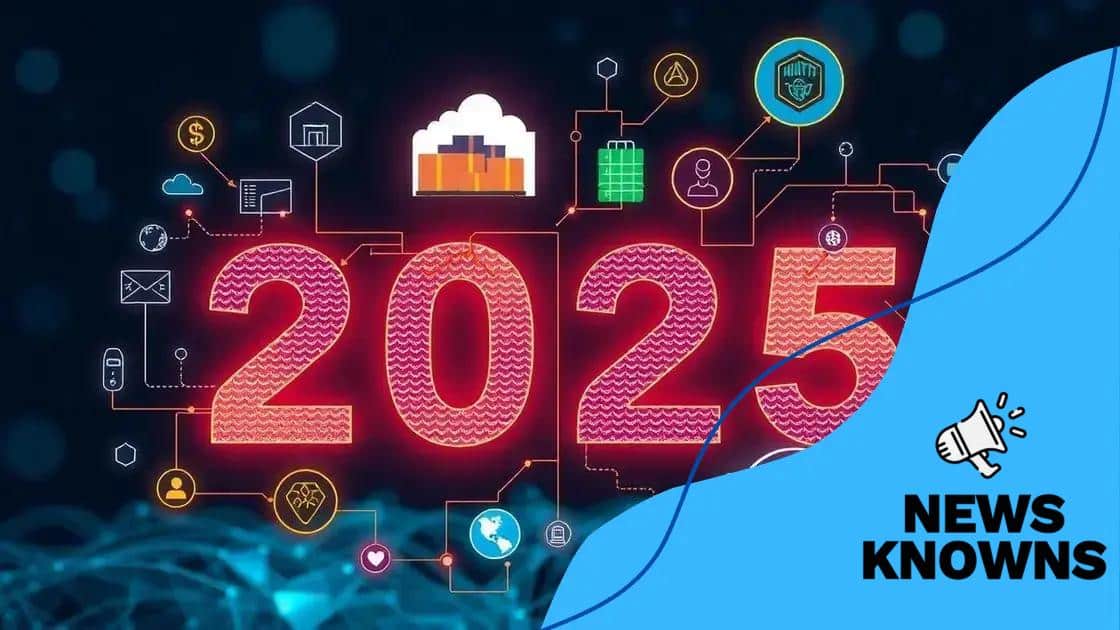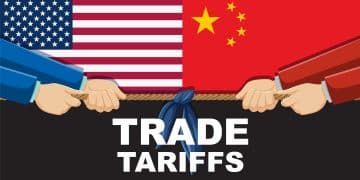How blockchain is securing supply chains in 2025

Anúncios
In 2025, blockchain secures supply chains by enhancing transparency, automating processes with smart contracts, integrating with IoT for real-time data, and promoting sustainability through traceability in ethical sourcing.
How blockchain is securing supply chains in 2025 is a topic that sparks curiosity. Have you ever wondered how this technology might transform logistics and ensure better transparency? Let’s dive in!
Anúncios
Overview of blockchain technology
The overview of blockchain technology lays the foundation for understanding its potential in various industries. Essentially, blockchain is a decentralized digital ledger that securely records transactions across many computers. This means that once a transaction is recorded, it cannot be altered, ensuring a high level of transparency and trust.
Key Features of Blockchain
Blockchain technology boasts several key features that contribute to its growing popularity.
- Decentralization: Unlike traditional databases, blockchain is not controlled by a single entity.
- Security: Transactions are secured by cryptography, making them resistant to hacking.
- Transparency: Everyone participating in the network can see the same data, enhancing trust.
- Immutability: Once recorded, data cannot be changed or deleted, ensuring data integrity.
These features make blockchain highly attractive for various applications, particularly in supply chain management. By enabling real-time visibility into transactions, stakeholders can monitor each step of the supply chain, reducing fraud and errors.
Anúncios
Blockchain also enhances traceability. With each product, a unique identifier can be recorded on the blockchain, making it easier to track its origin. This is especially important for industries like food and pharmaceuticals, where safety and compliance are paramount.
Types of Blockchain
There are three main types of blockchain: public, private, and consortium.
- Public blockchains are open to anyone and are typically decentralized, like Bitcoin.
- Private blockchains are restricted to certain users, often used within companies.
- Consortium blockchains are governed by a group of organizations, balancing control and collaboration.
Choosing the right type of blockchain depends on the specific needs of an organization, including privacy, speed, and control.
Benefits of blockchain in supply chains
The benefits of blockchain in supply chains are significant and far-reaching. This technology enhances efficiency, transparency, and security, which are crucial for modern supply chain operations. With blockchain, each transaction is recorded and visible to all parties, helping to eliminate delays and disputes.
Enhanced Transparency
One major benefit is enhanced transparency. Every participant in the supply chain can access the same data, creating a shared source of truth. This transparency builds trust among partners and customers, as they can verify the origin and journey of products.
- Real-time tracking allows businesses to monitor inventory levels and product movement.
- Verification of authenticity helps ensure that products are genuine, reducing fraud.
- Historical records provide insights into past transactions, improving decision-making.
Moreover, blockchain improves the efficiency of supply chains. By automating processes through smart contracts, businesses can reduce paperwork and manual errors. Smart contracts are self-executing contracts with the terms directly written into code. They automatically execute actions when specified conditions are met, speeding up transactions.
Increased Security
Another vital benefit is increased security. Blockchain’s decentralized nature makes it resistant to cyberattacks. Since data is stored across multiple locations, it is difficult for hackers to alter or delete information.
- Data encryption adds an additional layer of protection against unauthorized access.
- Access controls ensure that only authorized parties can view or modify transactions.
- Audit trails enhance accountability and traceability throughout the supply chain.
The integration of blockchain technology also leads to significant cost savings. Companies can reduce the expenses associated with intermediaries and enhance operational efficiency. By streamlining processes, businesses can allocate resources more effectively, leading to greater overall profitability.
Real-world applications of blockchain in 2025

In 2025, the real-world applications of blockchain are diverse and transformative, impacting various sectors including supply chain, healthcare, and finance. Businesses are increasingly adopting blockchain technology to improve efficiency, reduce costs, and enhance transparency.
Supply Chain Management
One of the most significant uses of blockchain is in supply chain management. Companies use blockchain to track products as they move from origin to consumer. This ensures that every step is recorded and verified, reducing the chances of fraud.
- Traceability: Consumers can verify the origin of their products, ensuring ethical sourcing.
- Real-time data access: Stakeholders can see updates instantly, improving decision-making.
- Reduced costs: By eliminating intermediaries, businesses save money on transactions.
In addition, sectors like agriculture benefit from blockchain, as it allows farmers to connect directly with consumers, gaining better prices for their goods.
Healthcare Solutions
Blockchain also plays a pivotal role in healthcare. By securely storing patient records on a blockchain, healthcare providers can access accurate and up-to-date information quickly. This not only improves patient care but also protects sensitive data.
- Interoperability: Different healthcare systems can exchange information seamlessly.
- Data integrity: Records are immutable, ensuring that patient information is accurate and reliable.
- Consent management: Patients have better control over who accesses their data.
These advancements help hospitals and clinics provide better service while maintaining patient privacy and security.
Finance and Banking
In the finance sector, blockchain is reshaping how transactions are processed. Traditional banking systems often involve multiple intermediaries, leading to delays and high fees.
- Faster transactions: Blockchain allows for near-instant transactions across borders.
- Lower costs: With fewer intermediaries, transaction fees are reduced.
- Smart contracts: Automated contracts are executed when conditions are met, streamlining processes.
These features make blockchain a powerful tool in improving financial services and offering consumers better options.
Challenges of implementing blockchain
The challenges of implementing blockchain are significant and often require careful consideration. While blockchain offers many advantages, its adoption is not without obstacles. Understanding these challenges is crucial for organizations looking to leverage this technology.
Scalability Issues
One major challenge is scalability. As more users join the network, the system can become slower. It can be difficult for blockchains to process a high number of transactions quickly while maintaining security.
- Transaction speed can decrease with increased activity, leading to delays.
- Network congestion may cause higher transaction fees.
- Storage requirements increase as more data is added to the blockchain.
Finding solutions to these scalability issues is essential to ensure that blockchain can handle enterprise-level demands.
Regulatory Concerns
Another significant hurdle is regulatory uncertainty. The legal landscape surrounding blockchain is still developing, and different jurisdictions have varied approaches to regulation.
- Compliance challenges arise as businesses must navigate complex regulations.
- Data privacy laws can conflict with blockchain’s transparency.
- Licensing requirements vary widely, complicating international operations.
These regulatory challenges can hinder innovation and slow down the implementation of blockchain solutions.
Resistance to Change
Resistance to change can also be a barrier. Many organizations are used to traditional ways of operating and may be hesitant to adopt new technologies like blockchain.
- Cultural resistance within organizations can slow down adoption.
- Training needs: Employees may require significant training to use blockchain technology effectively.
- Legacy systems may be incompatible with new blockchain solutions.
Overcoming this resistance is vital to successfully integrate blockchain into existing operations.
Technical Complexity
The technical complexity of blockchain can be daunting as well. Understanding how different blockchain platforms work can require specialized knowledge and skills. Additionally, the development and maintenance of blockchain systems can demand substantial resources.
- Integration issues with existing systems can arise if not planned properly.
- Security challenges exist, including protecting against smart contract vulnerabilities.
- Continuous updates: Technology is rapidly evolving, necessitating ongoing learning.
Despite these challenges, the potential benefits of blockchain can be significant. Addressing these issues head-on is essential for companies that want to be competitive in the future.
Future trends in blockchain and supply chain management
The future trends in blockchain and supply chain management show great promise as technology continues to evolve. As businesses and consumers demand more transparency and efficiency, blockchain is set to become a key player in these processes.
Increased Automation
One major trend is the increase in automation through the use of smart contracts. These contracts are self-executing agreements with the terms directly written into code. By automating tasks, companies can reduce human error and speed up transactions.
- Efficiency gains from automated processes lead to faster shipping times.
- Cost reductions can be realized by minimizing manual interventions.
- Improved reliability makes it easier to forecast and manage inventory.
As automation becomes more prevalent, companies will be better positioned to respond to market demands swiftly and efficiently.
Enhanced Integration with IoT
Another trend is the enhanced integration of blockchain with the Internet of Things (IoT). IoT devices can continuously collect and transmit data regarding supply chain activities. This real-time information helps stakeholders make informed decisions.
- Real-time tracking using IoT devices ensures that products are monitored throughout their journey.
- Data accuracy is improved, as devices provide constant updates.
- Predictive analytics can be utilized to forecast trends based on up-to-date data.
This integration not only improves visibility but also enhances responsiveness to issues that may arise during the supply chain process.
Advanced Analytics and AI
The future will also see greater use of advanced analytics and artificial intelligence (AI) in conjunction with blockchain. These technologies can help organizations analyze vast amounts of data and derive meaningful insights.
- Demand forecasting will improve through AI-driven analytics.
- Risk management strategies can be refined using predictive models.
- Operational efficiency can be maximized through data-driven decision-making.
This synergy between blockchain, AI, and advanced analytics enables organizations to streamline their operations and remain competitive in a rapidly changing market.
Sustainability and Ethical Sourcing
Sustainability will also play a significant role in the future of blockchain and supply chain management. Consumers are increasingly concerned about the ethical sourcing of products, and blockchain can help verify the authenticity of claims.
- Traceability allows consumers to track the journey of products from origin to shelf.
- Transparency will build trust with consumers who seek ethically produced goods.
- Environmental impact can be assessed to promote sustainable practices.
These trends highlight the growing importance of integrating ethical considerations into supply chain strategies.
FAQ – Frequently Asked Questions about Blockchain in Supply Chain Management
What benefits does blockchain provide to supply chain management?
Blockchain enhances transparency, improves traceability, and reduces costs in supply chain management by recording transactions securely and efficiently.
How does automation improve supply chain processes with blockchain?
Automation through smart contracts speeds up transactions and reduces errors by executing agreements automatically based on predefined conditions.
What role does IoT play in conjunction with blockchain?
IoT devices collect real-time data about products in transit, and when integrated with blockchain, they enhance visibility and decision-making in the supply chain.
What challenges do companies face when implementing blockchain in supply chains?
Challenges include scalability issues, regulatory uncertainty, resistance to change, and the technical complexities of blockchain technology.





